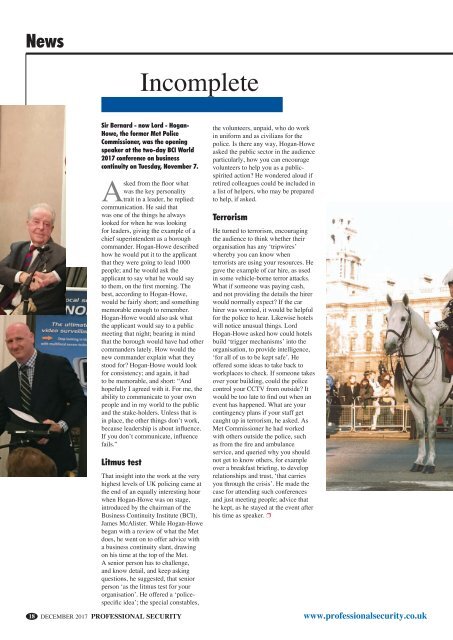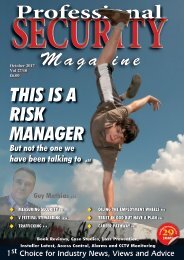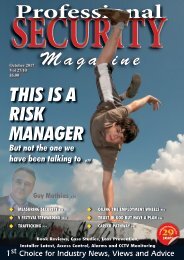Draft27-12
You also want an ePaper? Increase the reach of your titles
YUMPU automatically turns print PDFs into web optimized ePapers that Google loves.
News<br />
Incomplete<br />
Sir Bernard - now Lord - Hogan-<br />
Howe, the former Met Police<br />
Commissioner, was the opening<br />
speaker at the two-day BCI World<br />
2017 conference on business<br />
continuity on Tuesday, November 7.<br />
Asked from the floor what<br />
was the key personality<br />
trait in a leader, he replied:<br />
communication. He said that<br />
was one of the things he always<br />
looked for when he was looking<br />
for leaders, giving the example of a<br />
chief superintendent as a borough<br />
commander. Hogan-Howe described<br />
how he would put it to the applicant<br />
that they were going to lead 1000<br />
people; and he would ask the<br />
applicant to say what he would say<br />
to them, on the first morning. The<br />
best, according to Hogan-Howe,<br />
would be fairly short; and something<br />
memorable enough to remember.<br />
Hogan-Howe would also ask what<br />
the applicant would say to a public<br />
meeting that night; bearing in mind<br />
that the borough would have had other<br />
commanders lately. How would the<br />
new commander explain what they<br />
stood for? Hogan-Howe would look<br />
for consistency; and again, it had<br />
to be memorable, and short: “And<br />
hopefully I agreed with it. For me, the<br />
ability to communicate to your own<br />
people and in my world to the public<br />
and the stake-holders. Unless that is<br />
in place, the other things don’t work,<br />
because leadership is about influence.<br />
If you don’t communicate, influence<br />
fails.”<br />
Litmus test<br />
That insight into the work at the very<br />
highest levels of UK policing came at<br />
the end of an equally interesting hour<br />
when Hogan-Howe was on stage,<br />
introduced by the chairman of the<br />
Business Continuity Institute (BCI),<br />
James McAlister. While Hogan-Howe<br />
began with a review of what the Met<br />
does, he went on to offer advice with<br />
a business continuity slant, drawing<br />
on his time at the top of the Met.<br />
A senior person has to challenge,<br />
and know detail, and keep asking<br />
questions, he suggested, that senior<br />
person ‘as the litmus test for your<br />
organisation’. He offered a ‘policespecific<br />
idea’; the special constables,<br />
the volunteers, unpaid, who do work<br />
in uniform and as civilians for the<br />
police. Is there any way, Hogan-Howe<br />
asked the public sector in the audience<br />
particularly, how you can encourage<br />
volunteers to help you as a publicspirited<br />
action? He wondered aloud if<br />
retired colleagues could be included in<br />
a list of helpers, who may be prepared<br />
to help, if asked.<br />
Terrorism<br />
He turned to terrorism, encouraging<br />
the audience to think whether their<br />
organisation has any ‘tripwires’<br />
whereby you can know when<br />
terrorists are using your resources. He<br />
gave the example of car hire, as used<br />
in some vehicle-borne terror attacks.<br />
What if someone was paying cash,<br />
and not providing the details the hirer<br />
would normally expect? If the car<br />
hirer was worried, it would be helpful<br />
for the police to hear. Likewise hotels<br />
will notice unusual things. Lord<br />
Hogan-Howe asked how could hotels<br />
build ‘trigger mechanisms’ into the<br />
organisation, to provide intelligence,<br />
‘for all of us to be kept safe’. He<br />
offered some ideas to take back to<br />
workplaces to check. If someone takes<br />
over your building, could the police<br />
control your CCTV from outside? It<br />
would be too late to find out when an<br />
event has happened. What are your<br />
contingency plans if your staff get<br />
caught up in terrorism, he asked. As<br />
Met Commissioner he had worked<br />
with others outside the police, such<br />
as from the fire and ambulance<br />
service, and queried why you should<br />
not get to know others, for example<br />
over a breakfast briefing, to develop<br />
relationships and trust, ‘that carries<br />
you through the crisis’. He made the<br />
case for attending such conferences<br />
and just meeting people; advice that<br />
he kept, as he stayed at the event after<br />
his time as speaker. p<br />
18 DECEMBER 2017 PROFESSIONAL SECURITY www.professionalsecurity.co.uk<br />
p18 News 27-<strong>12</strong>.indd 1 19/11/2017 10:42










